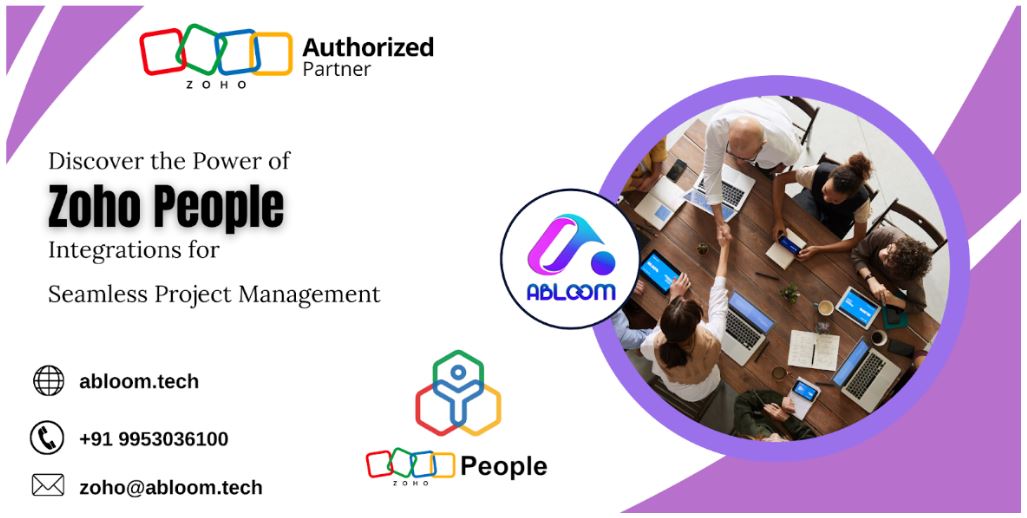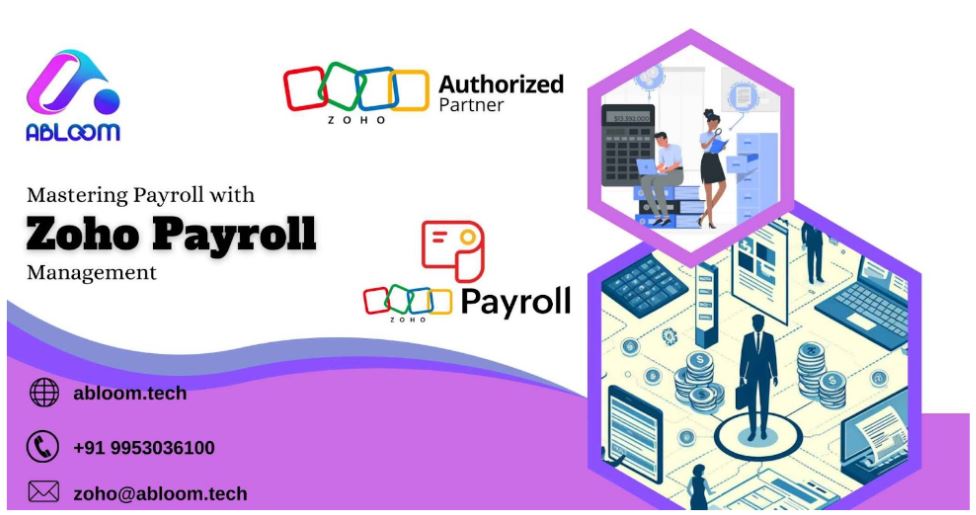Zoho Analytics: Unleashing the Power of Data-driven Decisions
Introduction
In today’s fast-paced business environment, making well-informed decisions is crucial for success. Data has become the cornerstone of strategic planning, and businesses need powerful tools to harness its potential. Zoho Analytics emerges as a game-changer in this scenario, empowering organizations to unlock the true power of data-driven decisions. In this blog post, we delve into the features and benefits of Zoho Analytics, demonstrating how Zoho CRM Consulting Partner can revolutionize the way businesses leverage their data.
Understanding Zoho Analytics
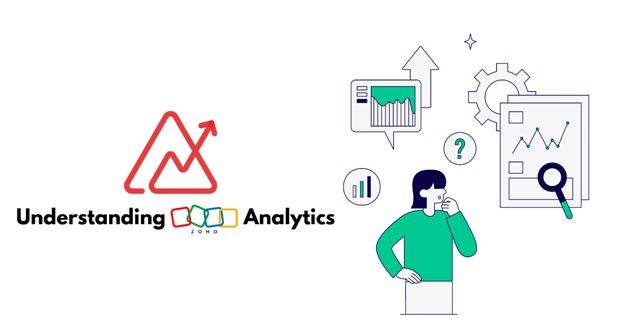
Zoho Analytics is a robust business intelligence and analytics tool that enables organizations to transform raw data into actionable insights. It goes beyond traditional reporting, offering business features catering to diverse industries. Whether you’re a small startup or a large enterprise, Zoho Analytics provides the tools to make sense of your data, driving better decision-making.
Key Features
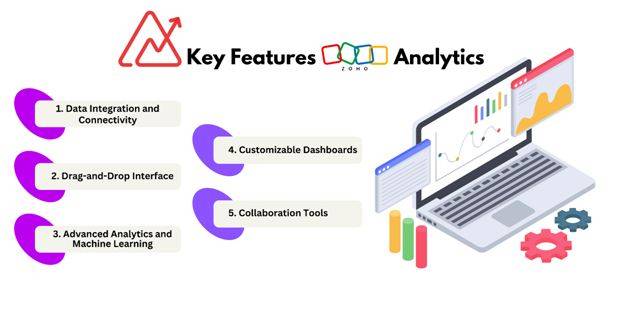
- Data Integration and Connectivity:
Zoho Analytics supports seamless integration with a wide range of data sources. The platform allows users to consolidate data from multiple channels, from spreadsheets and cloud storage to databases and third-party applications. It ensures that decision-makers have a holistic view of their business landscape.
- Drag-and-Drop Interface:
One of Zoho Analytics’ standout features is its user-friendly interface. With a drag-and-drop functionality, users can effortlessly create. With our software, you can quickly generate comprehensive reports and dynamic dashboards without dealing with complicated coding. It empowers teams across departments to rapidly develop insights and focus on strategic initiatives.
- Advanced Analytics and Machine Learning:
Zoho Analytics offers advanced analytics and machine learning capabilities beyond basic reporting. Users can leverage predictive analytics to forecast trends, identify patterns, and make proactive decisions. This predictive modeling enables businesses in a constantly evolving market to update themselves with the latest advancements.
- Customizable Dashboards:
The platform provides customizable dashboards catering to different stakeholders’ specific needs. Decision-makers can tailor dashboards to display key performance indicators (KPIs) and metrics relevant to their role, fostering a more personalized and efficient decision-making process.
- Collaboration Tools:
Zoho Analytics facilitates collaboration among team members by offering features such as data sharing, commenting, and user permissions. Ensuring everyone within the organization is on the same page is essential. They can contribute to the decision-making process based on their expertise.
Benefits of Zoho Analytics
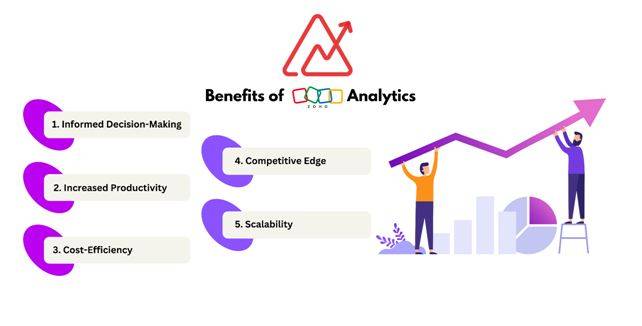
- Informed Decision-Making:
The primary advantage of Zoho Analytics is that By transforming raw data into meaningful insights, decision-makers are provided with accurate and up-to-date information. The platform enables organizations to make informed decisions that align with their strategic goals.
- Increased Productivity:
The intuitive interface and user-friendly features of Zoho Analytics contribute to increased productivity across teams. With the ability to quickly create reports and dashboards, employees can focus on analyzing data rather than spending time on manual data manipulation.
- Cost-Efficiency:
Zoho Analytics offers a cost-efficient solution for businesses seeking powerful analytics tools without breaking the bank. The platform’s scalable pricing model makes it suitable for both small and large enterprises.
- Competitive Edge:
A data-driven approach can provide a significant advantage in a competitive business landscape. Zoho Analytics empowers organizations to identify trends, understand customer behavior, and anticipate market shifts, giving them a competitive edge in their industry.
- Scalability:
As businesses grow, their data needs evolve. Zoho Analytics is designed to scale with the organization, accommodating an increasing volume of data and users. The platform’s scalability ensures it can grow and handle increasing amounts of traffic, data, and users without negatively impacting its performance—a valuable asset as the business expands.
Case Studies: Real-world Success Stories
To illustrate the impact of Zoho Analytics, let’s explore a couple of real-world success stories:
- E-commerce Optimization:
A leading e-commerce company needed help analyzing customer behavior and optimizing its online platform. The company gained insights into customer preferences, purchasing patterns, and website navigation by implementing Zoho Analytics. This data-driven approach resulted in targeted marketing campaigns, personalized user experiences, and increased online sales.
- Healthcare Analytics:
A healthcare organization faces challenges in managing patient data and improving operational efficiency. Zoho Analytics was deployed to consolidate patient records, analyze treatment outcomes, and optimize resource allocation. The platform’s predictive analytics capabilities enabled the organization to anticipate patient needs, reduce wait times, and enhance patient satisfaction.
The Zoho Analytics Advantage
Zoho Analytics is a cloud-based business intelligence platform designed to cater to the diverse analytics needs of organizations. From small businesses to large enterprises, Zoho Analytics offers a scalable and user-friendly solution that empowers users to explore, visualize, and derive insights from their data. Let’s delve into some key features that make Zoho Analytics a game-changer for data-driven decision-making:
- Easy Data Integration:
One of the standout features of Zoho Analytics is the capacity to blend in effortlessly with an extensive range of other systems. I have ensured that any spelling, grammar, and punctuation errors have been corrected. Data sources. Whether your data resides in spreadsheets, cloud storage, databases, or popular business applications, Zoho Analytics can pull it together in one centralized location. This ensures that decision-makers have a holistic view of the organization’s data landscape.
- Intuitive Data Visualization:
Understanding complex data sets can be challenging, but Zoho Analytics simplifies the process with intuitive and user-friendly visualization tools. From charts and graphs to dashboards, users can make their data more engaging; people can create visually appealing representations of it. It helps in presenting data attractively and understandably. It is more straightforward to identify trends, outliers, and correlations. This visual approach enhances comprehension and facilitates more effective communication of insights within the organization.
- Advanced Analytics and Machine Learning:
Zoho Analytics goes beyond basic reporting and offers software that offers advanced analytics features such as predictive analytics and machine learning. By leveraging these features, organizations can uncover hidden patterns in their data, predict future trends, and make proactive decisions. It is precious in industries where anticipating market changes can make or break a business.
- Collaboration and Sharing:
Effective decision-making often requires collaboration among team members. Zoho Analytics facilitates this by providing robust collaboration features. The original text has no spelling, grammar, or punctuation errors. People in the organization. Team members or stakeholders, ensuring that everyone is on the same page. Real-time collaboration enhances the agility of decision-making processes, especially in dynamic business environments.
- Customization and Scalability:
Every business is unique, and Zoho Analytics recognizes this by offering a high degree of customization. Users can tailor reports and dashboards to meet their requirements, ensuring the analytics solution aligns seamlessly with the organization’s goals and processes. Furthermore, Zoho Analytics is scalable, accommodating the growing data needs of businesses without compromising performance.
Conclusion:
In conclusion, Zoho Analytics stands as a beacon in data-driven decision-making, offering businesses a comprehensive solution to harness the power of their data. As we navigate the complexities of the modern business landscape, the ability to extract meaningful insights from data has become not just a competitive advantage but a necessity for sustained success. The platform’s seamless data integration, intuitive visualization tools, and advanced analytics features provide a solid foundation for organizations looking to elevate their decision-making processes. Zoho Analytics enables users to move beyond traditional reporting, offering a dynamic environment where data is transformed into actionable insights.
The benefits of implementing Zoho Analytics extend beyond operational efficiency and cost savings. It becomes a strategic asset, positioning businesses for a competitive edge in their respective industries. The platform’s scalability ensures that organizations, regardless of size, can adapt and grow with the evolving demands of their data analytics needs.
